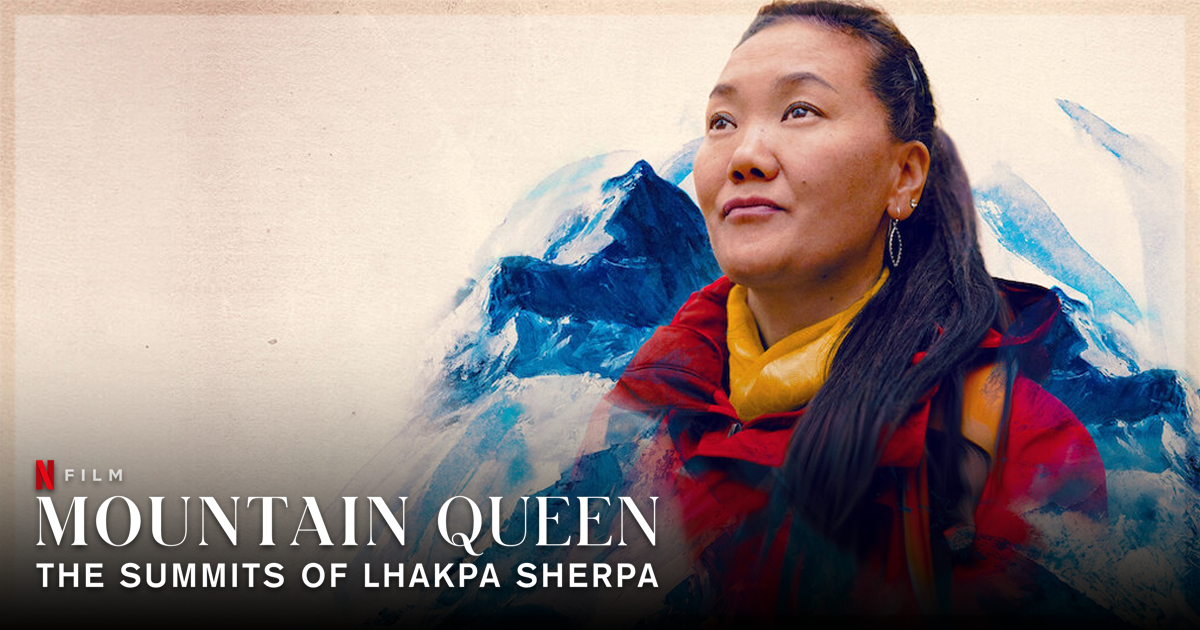The Sherpa community is a Nepalese and Tibetan ethnic group living near Everest Mountain. Regarded as excellent mountaineers, they live off the land, having their organization and lifestyle. Besides the traditions of not allowing women to study or have autonomy, Lhakpa Sherpa defied the paradigms. She would walk her brother for two hours for school because she could not take the yellow bus taking the students. She became a porter, carrying loads, the first in her community. She went on to be a kitchen boy, someone who cooks in the camps for those climbing Everest, someone who used to defy societal structures every day. Lucy Walker’s Mountain Queen: The Summits of Lhakpa Sherpa shows how she became a recordist in the summits.
The story within Mountain Queen: The Summits of Lhakpa Sherpa
Walker mixes two narrative focuses here. Firstly, there is the Sherpa community. How they live, the rules, and how Lhakpa went to challenge it. This is her past, the roots that shape her personality and lifestyle, the thrill of facing the deathly mountains. Another point of view is her immigration to the United States. Her life there with her children mainly concentrates on her relationship with Sunny and Shiny. Even though she is a world recordist in the Everest summits, Lhakpa is a whole foods worker. She has two lives: an ordinary one that allows her to put food on the table and an outstanding one in which she performs the most extraordinary features in the human race.
When the director blends these two stories, we have a surplus of nuances. The mountains symbolize the humane fight against nature. It embodies endurance against avalanches, storms, and freezing death. The feminine climbing is likewise an affirmation of their position in the Nepalese society that forbids them from getting an education. Meanwhile, Lhakpa confronts the sexist violence in her house. Her husband, George, a Romanian climber, would support and accompany her summits. However, he would turn into a violent creature in private, and Lhakpa was a victim of his aggression.
Visually, Walker thrives in the few moments that show during the climbing. The uphill scenes are scarce. However, the cinematography by Devin Whetstone and Matthew Irving is impressive. It takes the frightfulness of the mountain to the screen, and it transmits the constant despair of having your life at risk in all of your steps. It is the model work that you ask yourself how they could capture those frames. It proposes a frequent exercise of imagining the behind-the-scenes while you watch it. The camera movements and the misé-en-scene incorporate the risk and eminence of death.
At times, there is no cohesion between the flow of the two narrative points in Mountain Queen: The Summits of Lhakpa Sherpa. The editing has some moments that weigh more on the violent aspect of their relationship. In this sense, the incredible landmark of her tenth summit, a record for female climbers, is rushed. It takes time to contextualize his sickness and downfall, but it loses momentum when it goes to George. Besides being an important figure in her life, the film focuses too much on explaining his background rather than exploring the wounds left in Sunny, the older daughter. There is a conclusion to her ark at the end, but we learn very little about her.
The moments of interaction between Lhakpa and Shiny, her younger daughter, are fascinating. She acknowledges that her exposition to violence and trauma at such a young age. She was five when George smashed her face into the dining table. Nowadays, she is trying to acclimate her daughter to the Sherpa community: family, language, and culture. Shiny becomes a witness to the greatness of her mother. The connection serves as a baptism to the sacred lands of the mountain but also a therapy to heal the wounds of trauma and pain.
The strength of a woman with Everest as subtext
In its heart, the film is not only about the strength of a woman. It is about the recovery and reconnection of a family. Lhakpa and her return to climbing. Shiny meeting her people. Sunny is learning to heal her harm and to work on herself. The Everest climbing and records are only a subtext to a family deeply connected to that place. The film is about women recognizing and claiming the space that men would try not to allow them to be. The public watches Lhakpa reclaiming that and teaching her lineage about redirecting to their core.
Mountain Queen: The Summits of Lhakpa Sherpa explores the beauty of an impossible human feature and the overcoming of violence cycles by a survivor. The woman reclaims the space that she dominates to allow her daughters to follow their dreams. Lucy Walker presents us with a beautiful journey about the irregularities of life and the mountains.
Mountain Queen: The Summits of Lhakpa Sherpa is now streaming on Netflix.
Learn more about the documentary, including how to watch it, at the Netflix site for the title.


